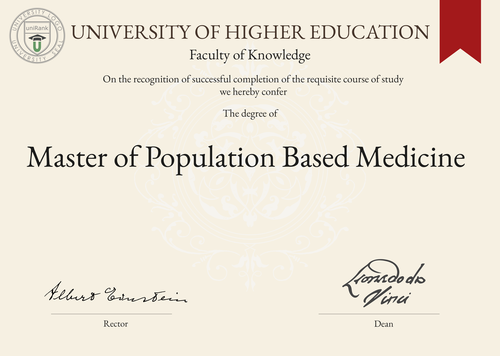
Master of Population Based Medicine (M.P.B.M.)
Guide to Master of Population Based Medicine Program/Course/Degree
Master of Population Based Medicine (M.P.B.M.)

Program Name:
Master of Population Based MedicineProgram or Degree abbreviation:
M.P.B.M.Duration range:
Varies by country and universityTuition range:
Varies by country and universityOverview:
The Master of Population Based Medicine program is designed to provide students with a comprehensive understanding of population health and its impact on medicine. This interdisciplinary program combines elements of public health, epidemiology, biostatistics and clinical medicine to equip graduates with the skills necessary to address health issues at a population level.Curriculum Overview by year:
The curriculum of the Master of Population Based Medicine program is structured to provide students with a strong foundation in population health principles and research methods. The coursework typically covers topics such as biostatistics, epidemiology, health policy, social determinants of health and research ethics. In addition, students may have the opportunity to engage in practical fieldwork or research projects.Key Components:
The key components of the Master of Population Based Medicine program include a focus on population health, interdisciplinary coursework, research methods and practical experience. Students will develop skills in data analysis, research design and critical evaluation of health interventions.Career Prospects:
Graduates of the Master of Population Based Medicine program can pursue a variety of career paths. They may work in public health agencies, research institutions, healthcare organizations, or government agencies. Potential job roles include epidemiologist, biostatistician, health policy analyst, research coordinator, or public health consultant.Salary Expectations:
Salary expectations for individuals with a Master of Population Based Medicine degree can vary depending on factors such as location, experience and job role. Generally, professionals in this field can expect competitive salaries that reflect their expertise and the demand for population health professionals. For a more accurate understanding of salary expectations, you can utilize the Job Sites Search Engine, from our sister site jobRank, which searches over 4,600 job sites worldwide. Make sure to specify not only the job title but also the country you are interested in.Conclusions:
The Master of Population Based Medicine program offers a comprehensive education in population health and its impact on medicine. It equips graduates with the skills and knowledge necessary to address health issues at a population level. However, it is important to note that program duration, tuition fees, curriculum, key components, career prospects and salary expectations can vary depending on the chosen country or location of study, as well as the chosen university. Visitors interested in pursuing this degree are encouraged to use the uniRank World Universities Search Engine to find institutions offering the Master of Population Based Medicine program worldwide.World Universities Search Engine
search for Master of Population Based Medicine (M.P.B.M.) and add the Location (country, state etc.) or specific University you are interested in studying at.
Query examples:
- Master of Population Based Medicine (M.P.B.M.) United States
- Master of Population Based Medicine (M.P.B.M.) United Kingdom online
- Master of Population Based Medicine (M.P.B.M.) Australia international students
- Master of Population Based Medicine (M.P.B.M.) University of California
- Master of Population Based Medicine (M.P.B.M.) University of London tuition fees
- Master of Population Based Medicine (M.P.B.M.) University of Sydney scholarships
Share Program/Course
Interesting? Share this program/course/degree info with your friends now.